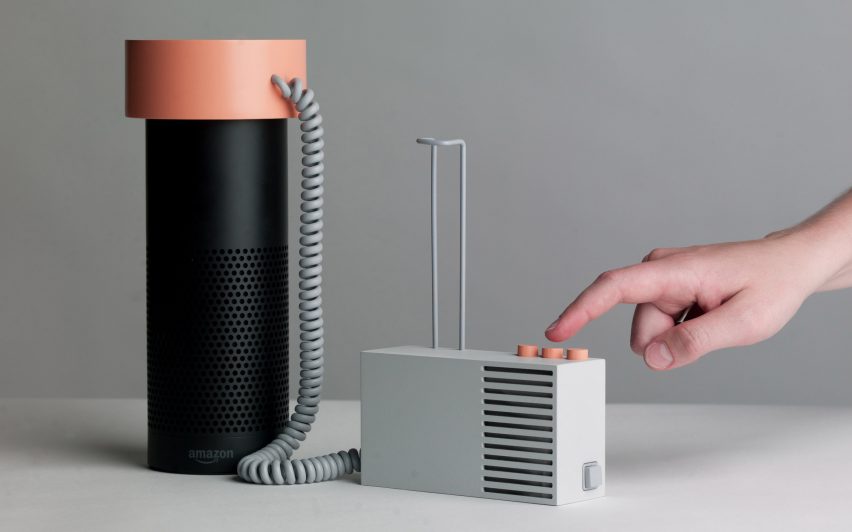As technology and artificial intelligence become more integrated into our lives and homes designers have invented ways to avoid surveillance and keep data private. Dezeen assistant editor India Block picks out six of the most interesting.
Accessories for the paranoid by Katja Trinkwalder and Pia-Marie Stute
Ever get the creeping feeling someone is watching? Designers Katja Trinkwalder and Pia-Marie Stute have created a range of products that are designed to thwart attempt to use domestic objects to spy on people.
Accessories For The Paranoid are "parasitic" devices that can be hooked onto technology in the home and feed it mis-information. One slots over a computer webcam and feeds it fake images, while another links to Amazon's Alexa home assistant device and plays it white noise or feeds it distracting fake tasks.
Read more about Accessories for the paranoid ›
Smell of data by Leanne Wijnsma
Leanne Wijnsma's product allows the user to literally sense when their online data is at risk of being leaked. Smell of Data is a grenade-shaped perfume bottle that releases a metallic fragrance when the user encounters an unprotected website or app.
In the same way that dangerous gasses are given a smell to acts a warning, Wijnsma hopes giving digital threats a could prompt them to take action to keep their data.
Read more about the Smell of Data ›
Jammer coat by Coop Himmelb(l)au
Coop Himmelb(l)au's Jammer Coat allows the wearer to physically hide their data. The spotty pattern of the quilted coat distorts the body's shape, making it harder to detect on scanners.
Metallic thread woven into the quilted material deflect radio waves and block trackers. Internal pockets for smartphones and wallets are lined with a material that blocks internet signal and credit card cloning devices.
Read more about the Jammer Coat here ›
Counterbug by Erlend Prendergast
Another device designed to confuse Amazon's Alexa is the Counterbug, by Erlend Prendergast. Its modular design allows the user to use three different attachments to maintain their privacy against the technology company's home AI virtual assistant.
The murmur attachment contradicts any overheard comments with conflicting information, while one called scramble shouts over any security trigger words such as "bomb".
Prendergast stresses that the the Counterbug is just satire, warning that "the only way to defend yourself against Alexa is to not buy an Alexa".
Ewa Nowak designed Incognito as a piece of facial jewellery that doubles as an anti-AI mask. The brass arms fit behind the wearer's ears like a pair of glasses, balancing the polished discs and plume between their eyes.
By perching reflective surfaces around the features facial recognition technology relies on, Incognito fools surveillance cameras and facial-recognition technology. By making the piece aesthetically pleasing, Nowak imagines a near future where anti-surveillance ornamentation is the norm.
Winston is a hardware filter that plugs into a modem and prevents online tracking and digital profiling while users browse the internet.
US start-up Winston Privacy designed the device to scramble, encrypt or anonymise any data generated by people using devices on the network. It also works for items in the home that might be connected to the internet of things, such as smart fridges and speakers.

